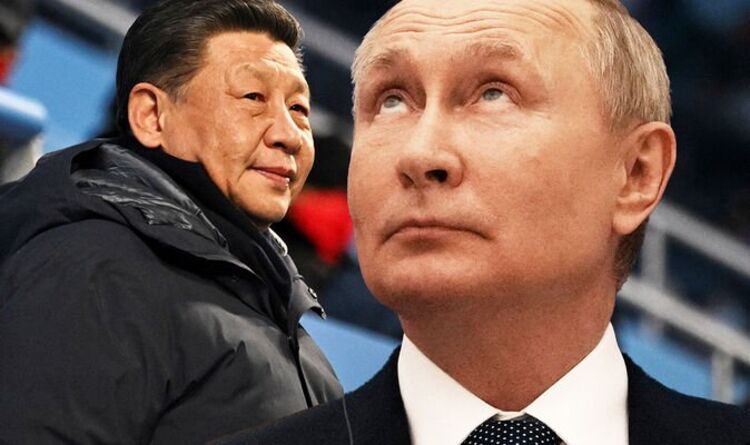

It comes as intelligence sources from the US and Nato confirmed that Russia now has enough forces to mount a full invasion next week. US officials have painted a stark picture of “an horrific, bloody campaign that begins with two days or aerial bombardment and electronic warfare, followed by an invasion, with the possible goal of regime change.”
Such an invasion by Russia could result in ruptures with ally China, plus see a hugely negative reaction among the Russian population.
According to the US sources, this could happen on Wednesday, though Nato sources say it is more likely to happen on Saturday. However, it was not clear whether these assessments come from actual intelligence from Russia or simply analysis by the Pentagon.
An emergency Nato Council meeting on Friday showed that divisions within the alliance still exist, with both Germany and France questioning the veracity of intelligence evidence indicating imminent invasion.
They were joined by Ukrainian President Volodymyr Zelensky, who yesterday also demanded the US share intelligence which suggests Russia is planning to invade his country on Wednesday.
Further diplomatic meetings with Putin by German Chancellor Olaf Scholz are planned for tomorrow in the hope that a raft of planned sanctions may still dissuade him.
UK citizens were urged to leave the country on Friday, and the small cadre of 100 British troops who have been training Ukrainian forces have been pulled out this weekend.
Britain’s Ambassador to Ukraine, Melinda Simmonds, is remaining for now with just a handful of staff, who are in lockdown.
Kyiv Mayor Klitschko confirmed preparations were underway to secure communication capabilities, increasing bomb shelters, stockpiling fuel and planning for an evacuation of the city.
Nato secretary general Jens Stoltenberg said: ”The number of Russian troops is increasing, as is their readiness and capability to conduct military actions in a very short timeframe. There is a real danger of invasion and we are preparing for many different scenarios.”
Those scenarios range from the annexation of Donbas, with the hope of creating a federal Ukrainian state capable of vetoing any hopes of the country joining Nato; creating a land bridge between Donbas and already-annexed Crimea; taking the city of Mariupul and the strategically important port of Odessa, to surrounding of Kyiv with troops in a bid to force regime change and, ultimately, complete military take-over.
However, Putin, who has always denied any intention to invade, does still hold another card: to simply recall his troops and watch divisions between Nato increase.
Should he choose an incursion, intelligence reports point to airstrikes, artillery and armour attacks followed by airborne assaults in the east, amphibious assaults in the city of Mariupul and Odessa as well as a smaller incursion through neighbouring Belarus.
Gen Barrons said it was more likely that Russia would focus on a smaller incursion. “The aim of Iraq 2003 was to get rid of Saddam Hussein. But If Putin acts in the same way, he opens up a vast opportunity for the West to provoke regime change in Russia,’ he said.
“Even if he had sufficient forces to hold Ukraine, which is doubtful, there is no groundswell of support in Russia for this. This is a war with less than 0.1 percent of Russia’s population.
“Instead of fighting for territory, Ukraine’s large forces should aim to put as many young Russians in body bags as quickly as possible. The West will convey this to as many Russians as possible using social media with messages like: ‘If you haven’t heard from your son, he’s dead’.
“Couple this with economic isolation, angry oligarchs, a trashed currency, trade and income, and Putin’s regime may find it’s not as well insulated as he thinks. “
A full invasion which risks rendering Ukraine a failed state would also not please Russia’s new strategic partner, China – for whom the country is an important plank to its BRI route to Europe.
China expert and former UK diplomat Matthew Henderson said: “China doesn’t want Russia to invade Ukraine. The nexus of power in this partnership is at its greatest now, before the event,” said
“Once it happens, China would find itself enmeshed in unknown unknowns. Beijing likes stability and values its relationship with Europe.
“I am sure that Xi and Putin will have discussed this and it’s worth remembering that Russia is very much the junior partner.”
Last night defence committee chair Tobias Ellwood MP warned: “This is our Cuban missile crisis moment”, adding that allowing Ukraine to fall would see a “new era of instability with a Russia and China axis developing” with the West “shrinking in size” and authoritarianism on the rise.
Gen Barrons added: “It may seem that we are now playing for our relationship with Russia. But much greater issues, including the rise of Asia, effects of population growth, climate change and dislocation of the digital age, mean we must stand up for our values in a time when those things are no longer guaranteed as they once were.
“For that reason, he said. Russia must face the same harsh sanctions even if Putin mounts a more limited incursion.
“Putin will hope for such an overwhelming sense of relief by the West that he faces little sanction. The west must not differentiate between a defeat in inches rather than miles.
“China is looking to see how far a country with 140 million people and a GDP the size of Spain’s can push around 500 million Europeans.
“What we are actually playing for now is the conversation we must face with China later about how the world works.”





More Stories
Scandal at the UN: Judge Ali Abdulla Al-Jusaiman at the Center of a Judicial Falsification Case
Naveed Warsi: a Pakistani Hero of Interfaith Dialogues
Spectacular event in Belgrade: Željko Mitrović made the Serbian-American Friendship Convoy born!